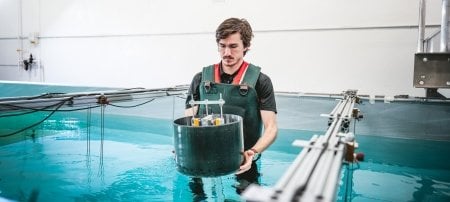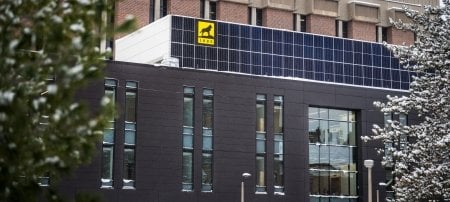Michigan Tech Names 3 Endowed Chairs, Adds Sustainability Faculty
In a bold, first-ever Strategic Faculty Hiring Initiative (SFHI) that cuts across academic disciplines to focus on a research theme, Michigan Technological University has named three professors to endowed chairs and hired seven additional new faculty members. Their research focuses on sustainability.
Michigan Tech’s Board of Trustees adopted the new hiring concept last year, as a multi-year drive to enhance the University’s competence in selected research niches and to increase the size of the faculty to a level appropriate to a leading technological research university.
“The Board of Trustees recognized that we must make a long-term investment to position Michigan Tech as a premier university capable of responding to our world’s emerging challenges and workforce needs,” said Michigan Tech President Glenn D. Mroz.
Sustainability is already a central theme of research across many disciplines at Michigan Tech. The University's goal is to make Michigan Tech a world leader in creating and communicating the science and technology necessary to support a sustainable future.
Within the broad scope of sustainability, research groups are already working on air, water, energy and materials. The new Robbins Chairs in Sustainability target three areas where sustainability is practiced: sustainable management of the environment, sustainable design and manufacturing, and sustainable materials.
Named to the Robbins Chairs in Sustainability were David F. Karnosky (sustainable management of the environment), David R. Shonnard (sustainable materials) and John W. Sutherland (sustainable design and manufacturing). Karnosky is a professor of forest genetics and forest biotechnology and director of the Ecosystems Science Center in the School of Forest Resources and Environmental Science. Shonnard is a professor of chemical engineering, and Sutherland is a professor of mechanical engineering-engineering mechanics and director of the Sustainable Futures Institute. He presently holds the Henes Chair in Mechanical Engineering.
“These chairs were made possible through the generous support of Dick and Bonnie Robbins, who recognized that our students' understanding of the fragile nature of the world around them depends on direct experience in class and research on today’s key environmental challenges,” said Mroz.
Richard Robbins graduated from Michigan Tech in 1956 with a Bachelor of Science in Mechanical Engineering. He and his wife explained why they endowed the chairs for interdisciplinary sustainability research.
“Three sustainability chairs add impact to Michigan Tech’s progressive work on some of the world’s complex problems,” they said. “Interdisciplinary work involving teams of students and faculty provides a truly broad view and solutions that could achieve unexpectedly creative results for world-class sustainable progress.”
New faculty includes Rupali Datta, Paul Doskey, Wenzhen Li, Audrey Mayer, Claudio Mazzoleni and Shiliang Wu.
“Many of the faculty hired through this initiative may not fit the traditional mold of any single academic department,” said Michigan Tech Provost Lesley Lovett-Doust. “Because they are involved in interdisciplinary research, they are valued as professors in more than one of the traditional disciplines, so we have, where possible, shared these new professors between two areas so that they can contribute to both academic programs.”
Cross-disciplinary hiring is not the only innovative aspect of the SFHI. A committee representing all of Michigan Tech’s colleges and schools crafted a unique hiring process that incorporated evaluation of candidates by existing faculty whose interests were close to those of the applicant, and invited feedback on the live and videotaped presentations of the candidates by the entire University community. The goal was to ensure that the faculty hired would be the very best, regardless of their academic field.
Lovett-Doust added, “This initiative will add to the capacity of the University to support growth in doctoral education and research productivity, particularly in interdisciplinary programs such as the graduate certificate in sustainability, the PhD program in atmospheric sciences, and proposed doctoral programs that might address more efficient and sustainable industrial processes, environmental public policy and natural resource economics. Our students, both graduate and undergraduate, will benefit greatly from this interdisciplinary scholarship, which will reinforce the connection between research and learning.”
Robbins Endowed Chairs
David Karnosky’s recent research has focused on the sustainability of the productivity
of forest ecosystems in this time of global change. His decade-long Aspen FACE project
has been examining the impacts of elevated levels of greenhouse gases--carbon dioxide
and ozone--on the forests of northern Wisconsin. He also is working in the US and
West Africa to improve forest productivity and increase the capacity of forests to
sequester carbon to help offset increasing concentrations of carbon dioxide in the
atmosphere, while developing useful, value-added forest products from indigenous tree
species that will help support local communities with outside revenue. Karnosky has
been on the faculty of Michigan Tech’s School of Forest Resources and Environmental
Science since 1983.
David Shonnard, a founding participant in Michigan Tech’s Wood to Wheels research, works on the development of processes to produce more efficient and cleaner-burning ethanol from wood and other forest-based biomass. He conducts enzyme-engineering research to improve the conversion of the cellulose in wood to glucose, which can in turn be fermented into ethanol. His goal is to help achieve sustainability through the production of forest-based biofuels. Shonnard was recently named one of four Michigan Tech faculty members in the state’s first University Center of Energy Excellence. Shonnard joined Michigan Tech’s Department of Chemical Engineering in 1993.
John Sutherland conducts research designed to reduce the environmental impact of manufacturing processes, to promote remanufacturing and recycling, and to develop product designs that support used product recovery and remanufacturing. Sutherland also works to develop model corporate and networking systems that support sustainability. The Strategic Futures Institute that he heads is a nexus for discussion and innovation in sustainability research, education and outreach. It supports the NSF-funded IGERT program (Interdisciplinary Graduate Education and Research Traineeships), which emphasizes interdisciplinary research by diverse groups of students. Sutherland has been on Michigan Tech’s Department of Mechanical Engineering-Engineering Mechanics faculty since 1991.
New SFHI Faculty
Rupali Datta has been at the University of Texas at San Antonio. With her collaborators,
she has developed a plant-based method of detoxifying soils contaminated by lead-based
paint, using vetiver grass (Chrysopogon zizanioides). She will hold a faculty appointment
in the Department of Biological Sciences.
Paul Doskey comes to Tech from Argonne National Laboratory, where he worked in the Climate Research Section. He studies environmental and biogeochemical processing of organic chemicals and of gases and aerosols that affect climate. He also develops models to predict the fate of chemicals in the environment under various conditions. He will hold an appointment in the Department of Civil and Environmental Engineering.
Wenzhen Li, who joins Tech from the College of Nanoscale Science and Engineering at the State University of New York-Albany, works with proton exchange membrane fuel cells. This nanotechnology shows promise as a method of converting hydrogen or methanol directly into electrical energy, with zero emissions. He will hold a joint appointment in the Department of Chemical Engineering and the Department of Chemistry.
Audrey Mayer comes to Tech from the University of Helsinki. Her research focuses on sustainability indices, which can help manage environmental systems by measuring the impact of time and space as well as the interaction of ecological, economic and social dimensions. She will hold a joint appointment in the Department of Social Sciences and the School of Forest Resources and Environmental Science.
Claudio Mazzoleni joins Tech from Los Alamos National Laboratory. His research focuses on air quality and climate science, including measurement and analysis of emissions from large fleets and biodiesel-powered vehicles under real-world conditions and characterization of the properties of aerosols that can affect climate. He will hold a faculty appointment in the Physics Department.
Shiliang Wu holds a postdoctoral position at Harvard University; his research is in the area of atmospheric sciences, and biosphere-atmosphere interactions. Wu will hold a joint appointment in the Department of Geological and Mining Engineering, and the Department of Civil and Environmental Engineering.
The final new faculty member, who is completing arrangements to move to Michigan Tech from his current position, is an expert on energy conservation in the built environment, particularly in relation to lighting and heating/ventilation/air conditioning (HVAC). His specialty is an integrated approach to the “green retrofitting” of existing buildings. He will hold a joint appointment in the Department of Mechanical Engineering-Engineering Mechanics and the Department of Civil and Environmental Engineering.
Michigan Technological University is a leading public research university, conducting research, developing new technologies and preparing students to create the future for a prosperous and sustainable world. Michigan Tech offers more than 120 undergraduate and graduate degree programs in engineering, forestry and environmental sciences, computing, technology, business and economics, natural and physical sciences, arts, humanities and social sciences.
Michigan Technological University is a public research university founded in 1885 in Houghton, Michigan, and is home to more than 7,000 students from 55 countries around the world. Consistently ranked among the best universities in the country for return on investment, Michigan’s flagship technological university offers more than 120 undergraduate and graduate degree programs in science and technology, engineering, computing, forestry, business and economics, health professions, humanities, mathematics, social sciences, and the arts. The rural campus is situated just miles from Lake Superior in Michigan's Upper Peninsula, offering year-round opportunities for outdoor adventure.




Comments